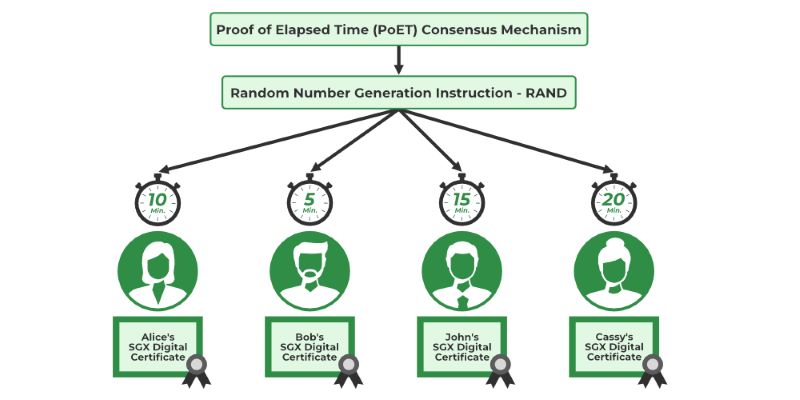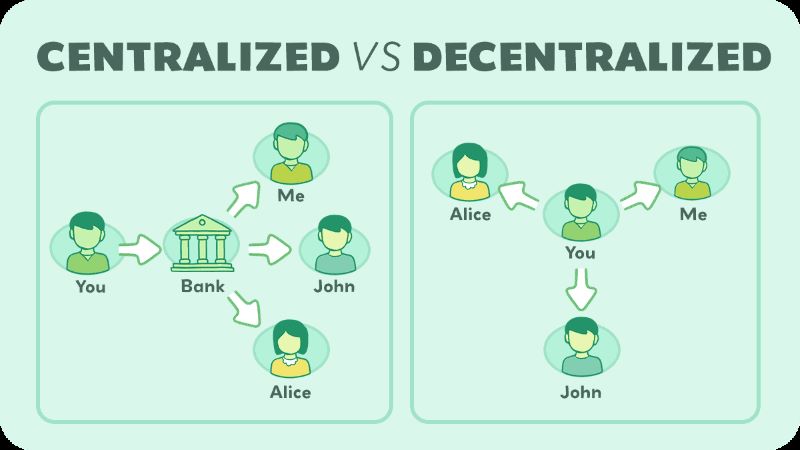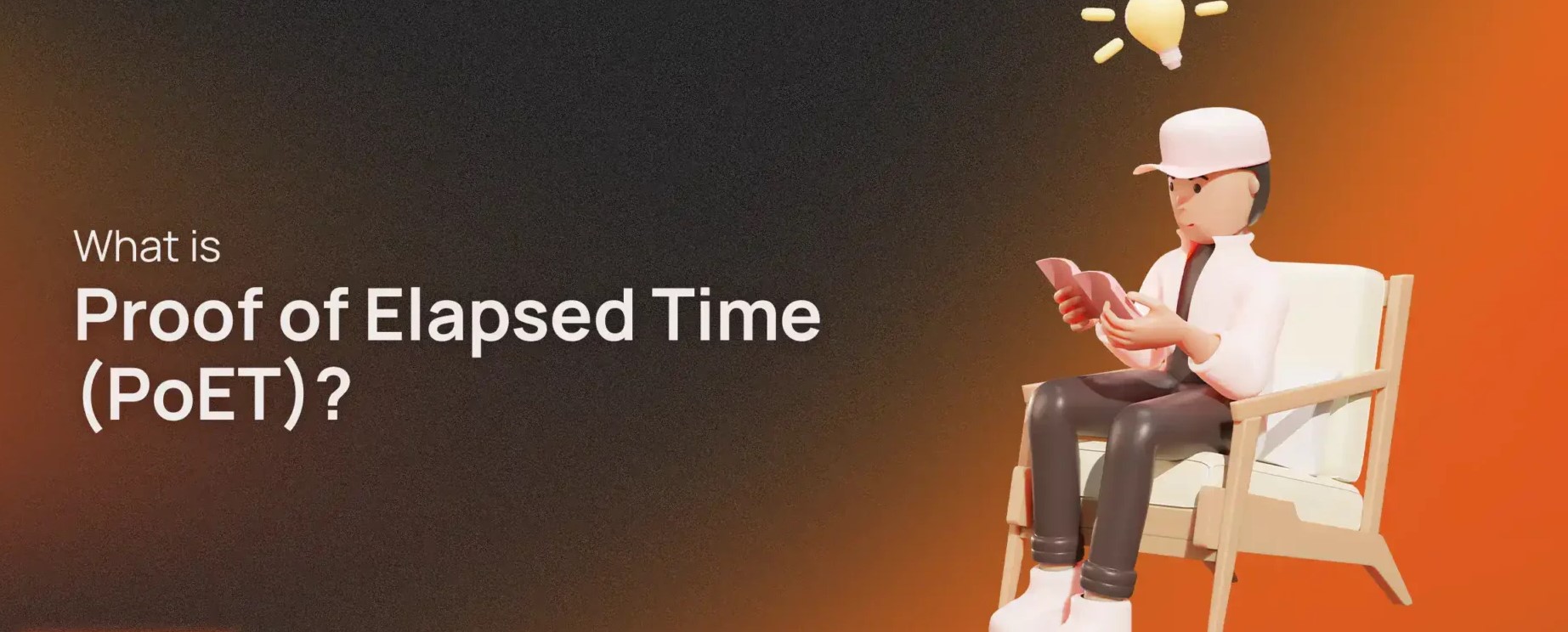Imagine a world where blockchain not just shines for its brilliance, but also for its friendliness to our planet. Step into the future of digital security with Proof of Elapsed Time in Crypto—a smarter, greener alternative shaking up the tech space. What if I told you that hidden within the clockwork of technology, there’s a key to secure, sustainable crypto practices? Gone are the days of wasteful energy consumption—let me guide you through the perks of PoET, a system that could rival the giants of crypto security. Buckle up; it’s time to unravel the tech set to redefine blockchain’s blueprint.
Understanding Proof of Elapsed Time (PoET) in Blockchain Technology
What is Proof of Elapsed Time (PoET)?
Proof of Elapsed Time (PoET) is a fair way to play the crypto game. It’s like a digital “raffle” where the winner gets to add a new block to the chain. Everyone in the network waits for a random time. The first one whose timer runs out wins the raffle. They add new info to the blockchain. This makes sure no one cheats or takes more than their share.
In PoET, every player has a secure clock. This clock counts down from a random time. It’s like waiting your turn, but you don’t know how long until it’s up. When the clock hits zero, you get a chance to add to the chain. It’s based on luck, but also on trust. This is because everyone knows the game is fair.
This system uses less energy. It is better for the Earth. It doesn’t need big computers like some other crypto games do. Instead, it relies on trust and time, making it good for our planet and our pockets.
PoET Consensus Algorithm: Advantages Over Proof of Work (PoW)
When we talk about PoET, we often compare it to Proof of Work (PoW). PoW is the old way, where miners solve puzzles to add blocks. But it uses a lot of electricity – too much. It’s not great for our world.
PoET, on the other hand, is a breath of fresh air in crypto. It’s like having a race without causing a mess. PoET’s clever wait-your-turn method uses less power. Think of PoW as a gas-guzzling truck. Now, think of PoET as a bike. It gets you there without the smoke.

Let’s dive into why PoET shines. It gives everyone a fair shot at winning. It’s not about who has the biggest, fastest computer. It’s about who has a little luck and a good clock. This levels the play field and makes it all more secure. Cheaters can’t win if the game is fair.
This fairness comes from rules built into the network. These rules are like referees in a game. They keep an eye on everything. They use math and secret codes to make sure each wait time is a surprise. No one can fake this. Everyone trusts the process because they know it’s rock-solid.
PoET is also about making smart contracts smarter. Smart contracts are like robot handshakes; they make deals without humans having to step in. In PoET, we can trust these robot deals because we trust the timing. It’s like everyone agrees to check their watches, and when the time is right, the deal is done.
The cool part? PoET is good for more than just cash. It can handle all sorts of things on the chain, like who owns a house or a tune. It’s not picky. It helps us trade fair and square, whether it’s a coin or a song.
In the end, PoET could change the game for good. It’s new, it’s fair, and it loves our planet. It’s a smart way to keep our digital world running smooth while keeping it green.
The Intel Sawtooth Platform and Its Role in PoET
Integrating PoET with Intel Sawtooth for Secure Networks
You may be asking, “What is this Intel Sawtooth platform?” Simply put, it’s a space where businesses can build secure blockchains. It’s where proof of elapsed time, or PoET, shines the most. This setup uses trust to make sure crypto is safe and true.
Picture a race where no one can jump the start. Each racer waits for a set time to run. This is what PoET does with transaction blocks in crypto. It makes sure that everyone gets their turn to add a block, by waiting. This wait-time is the heart of PoET, and it’s what keeps things fair.
The Intel Sawtooth platform embraces this idea. It lets companies create blockchains that only let in certain participants, known as permissioned blockchains. These networks are like VIP rooms—special keys for special guests. Here, PoET is the bouncer, making sure everyone plays by the rules.
With PoET and Intel Sawtooth, new blocks on the blockchain are like trains leaving on time. Each gets a window to leave the station. This prevents line-cutting, which can happen on other blockchains. It’s part of what makes this approach so groundbreaking.
Energy Efficiency and Sustainability via the Intel Sawtooth Platform
Let’s dive into why PoET is such a big deal for saving energy. You’ve heard of proof of work, right? It uses a lot of power, like a huge factory going non-stop. Now, think of PoET as the wise owl, picking the right time to act. It waits its turn, using less energy—a true proof of work alternative.
The Intel Sawtooth is the stage for this eco-friendly show. It’s built to run PoET, putting the brakes on that power-hungry machine. Blocks here move in an orderly fashion, like water through a canal. It’s timed, controlled, and above all, it doesn’t waste energy.

People are talking about our planet and how we need to keep it clean. Crypto usually gets bad press for how much juice it sucks up. But here’s the kicker—PoET, mixed with Intel Sawtooth, cuts down on that a lot. Reducing energy consumption is key. It’s about keeping our skies blue and our seas clean.
In a race for the greenest blockchain, Intel Sawtooth is lapping the field. It serves as the foundation for a sustainable cryptocurrency. It’s not just a smart choice; it’s the right one for our future.
Understanding PoET and using it on platforms like Intel Sawtooth is a no-brainer. But just like a good meal, it’s all about how you cook it. And that’s what we’re getting right—making crypto mining efficient, green, and good for our world.
PoET’s Impact on Crypto Mining and Environmental Sustainability
Improving Crypto Mining Efficiency with PoET
What if we could mine crypto without high power costs? Proof of Elapsed Time (PoET) makes this possible. It’s a new tech that’s changing how blocks are made in a blockchain. With it, we don’t need pricey, power-hungry machines to keep our crypto network safe. Instead, PoET picks who makes the next block by seeing who has waited their turn.
PoET is fair, and it doesn’t freeze out anyone with less fancy gear. Every miner in the network has a random shot at adding a block. This is because PoET works like a digital lottery. But instead of luck, it uses time to pick the winner. It’s like giving everyone a fair place in a line without letting anyone cut in.
Here’s how it works. First, each miner’s computer takes a break, waiting for a random period. Once the time’s up, it gets a chance to add a block to the blockchain. Think of kids raising hands in class. The teacher, in this case, PoET, points at who’s next. This way, no one kid hogs all the turns.
With PoET, we don’t sweat over who wins. A system clock keeps track, making it tough to cheat. PoET’s honesty is what makes it stand out. We get a square deal on who adds to the blockchain, without burning through so much electric juice.
Reducing the Carbon Footprint in Blockchain with Energy-Efficient Mining
How does PoET help our planet? It’s simple. It slashes the power we need to run a crypto network. PoET is a friend to the Earth, unlike its cousin, Proof of Work (PoW). PoW makes miners solve tough math puzzles. These puzzles need computers that chomp through tons of power.
With PoET, your computer just waits its turn. There’s no need for a math marathon, and no need for beefy, power-thirsty rigs. This means way less energy used, and that’s great news for our planet.
By now, you get that PoET cares about fairness and saving power. But here’s more. It also keeps a ledger, like a diary of all crypto deals. This ledger is open for all to see, and it’s tough as nails to mess with. It’s this mix of smart tech and green thinking that’s setting PoET apart from the rest.
Now, imagine this. It’s a hot day and the earth thanks you. Why? Because we chose PoET for our crypto mining. Our power bills shrink, and we tread lightly on our world. Mother Nature gives us a wink and a nod, as we use tech that’s both clever and kind.
In short, PoET turns the tide in crypto mining. It champions energy-efficiency, rocks solid security, and makes sure everyone gets a shot. It’s not just about cashing in on crypto; it’s about doing it with heart and smarts. And that’s a win for both our wallets and our world.
Future of Proof of Elapsed Time: Scalability and Security
Enhancing Network Security Through Time-Based Consensus Mechanisms
What makes Proof of Elapsed Time unique? It uses the clock. Unlike Proof of Work, it doesn’t need powerful computers to secure a blockchain. Instead, it relies on a simple timer to decide the order of new blocks. This means that any computer with the right tech can join in, without needing to race others with more muscle.
Proof of Elapsed Time, or PoET, levels the playing field. By using timers, it stops richer miners from overpowering others. Every computer in the PoET game gets a random wait time. When their time’s up, they get a turn to add to the blockchain. It’s like taking a number at the deli. No rush, no fuss, just fair turns.
A safe blockchain has to stop double-spending and fraud. PoET does this with smart tech, keeping an eye on the clock. It’s harder to cheat when you have to wait your turn. This timer method keeps bad actors out and lets good ones build a secure crypto network.
The Role of TEE Technology in Advancing PoET Security and Efficiency
Now, what’s TEE, and how does it help? TEE stands for Trusted Execution Environment. These are special bits in the hardware that keep the PoET clock safe. They make sure no one can mess with the timers.
Each player in the network has their own TEE. It checks that their wait time is over before letting them add a block. Because it’s in the hardware, hackers can’t easily change the timers. That makes the blockchain safer.
TEE doesn’t just keep time. It also looks at the work going into the blockchain. It checks each piece of info before it’s locked in. This means only good data gets in, making the crypto network really strong.

In a way, PoET and TEE work together like a bank vault. PoET sets the rules for who gets in line to access the vault. TEE makes sure they follow the rules before they get in. This stops people from sneaking in line or breaking in.
This teamwork is why we say PoET is a smart pick for the future. It’s not just about using less power. It’s also about building blockchain networks that won’t break down. The point is, we can trust these networks more. They give everyone the same shot, keep the bad guys out, and don’t drain the Earth’s power. That’s a win-win-win, don’t you think?
In this post, we dug into Proof of Elapsed Time, or PoET—a fresh way to handle blockchain tech. If you missed it, PoET is an algorithm that’s way kinder on our planet than the old Proof of Work (PoW) system. It’s all about saving power while still keeping networks safe.
We also peered into how Intel Sawtooth steps up the game. It kind of marries PoET to create networks that tough against trouble, all while cutting down the energy bill. That’s big news for crypto mining; it means we can keep our digital coin digs without hurting the Earth.
Looking ahead, PoET’s got a bright future. It’s set to make blockchain smoother, faster, and still rock-solid secure. Plus, it leans on TEE tech—that’s all the secret sauce for keeping things super secure and slick in speed.
Bottom line: PoET could change the game for good, making crypto kinder to our wallets and the world. Let’s watch this space—the best could be yet to come!
Q&A :
What is Proof of Elapsed Time (PoET) in cryptocurrency?
Proof of Elapsed Time, or PoET for short, is a consensus mechanism used by blockchain networks to achieve distributed consensus. It determines which member of the network gets to produce the next block by electing the participant who has waited for an arbitrary period. By mimicking a fair lottery system, PoET promotes energy efficiency and reduces the computational power required in the process of block creation.
How does Proof of Elapsed Time ensure security and fairness in block creation?
PoET leverages a trusted execution environment (TEE) – such as Intel’s Software Guard Extensions (SGX) – to ensure that the process of waiting is carried out securely and that every participant in the network has an equal chance of being chosen to create the next block. The TEE provides a random wait time and ensures that the selection process is tamper-proof, preventing the likelihood of manipulation or unfair advantages.
What are the advantages of using Proof of Elapsed Time in blockchain technology?
There are several key benefits to using the Proof of Elapsed Time consensus method. Firstly, it is more energy-efficient than Proof of Work as it does not require extensive computational resources. Secondly, it is fairer because it relies on a random lottery rather than on computational power or stake size. Lastly, it provides a scalable solution, allowing for more participants in the network without significantly increasing energy consumption or degradation of performance.
How does Proof of Elapsed Time differ from other consensus mechanisms like Proof of Work or Proof of Stake?
Proof of Elapsed Time differs from Proof of Work (PoW) in that it does not require miners to perform energy-intensive calculations. Instead, it randomly selects a node based on a waiting time, which drastically reduces energy consumption. Compared to Proof of Stake (PoS), PoET does not favor participants based on the number of coins they hold. This can be seen as a more democratic approach, as all nodes have an equal opportunity to create a block based on time elapsed.
Can Proof of Elapsed Time be used in conjunction with other consensus mechanisms?
Yes, Proof of Elapsed Time can be implemented alongside other consensus mechanisms to create a hybrid approach. For instance, a blockchain network might use PoET in tandem with Proof of Stake to benefit from the energy efficiency of PoET while also leveraging the economic stake incentives of PoS. Hybrid models can offer improved security, reduced energy consumption, and balanced incentive structures. However, the specifics of such an implementation depend on the design and goals of the particular blockchain network.


